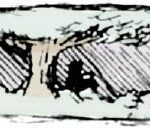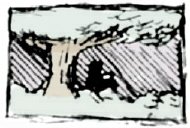
 This morning, I am sitting here in the Jolt’n Bolt Coffee and Tea House. My laptop is hooked up to the free Wi-Fi and I am online working on my WIP short story. Ah, living the cliché!
This morning, I am sitting here in the Jolt’n Bolt Coffee and Tea House. My laptop is hooked up to the free Wi-Fi and I am online working on my WIP short story. Ah, living the cliché!
I realize that what I’m doing is the premise of a thousand cynical jokes about writers writing in public. The point of writing in public is to be seen writing, right? So that some non-writer will notice us and maybe — please please pleeeease — ask us what we’re writing!?
Well, let me tell you about Jolt’n Bolt early on a Saturday morning. A few people come in, grab a coffee, and head right back out. There weren’t more than a couple people in here at a time until around 0830. The only attention I’ve gotten was from the fine employees behind the counter and one customer’s curious beagle.
This is cool with me, because I don’t write in public to be seen by the public, and I resent (just a lil bit) the amateur psychoanalysis behind the presumption that I am here to engage in writing-as-conversation-starter. And, I bet I’m not the only writer who feels this way, so let me kick this dismissive stereotype in the shins for a moment.
Continue reading →

 History teacher Michael Morgan has a great article on first contact between English colonists and the Algonquian people living in what is now the State of Delaware at DelmarvaNow.com. The encounter was not peaceful because the Kuskawaroak, or White Bead Makers*, were naturally very distrustful of the odd-looking invaders.
History teacher Michael Morgan has a great article on first contact between English colonists and the Algonquian people living in what is now the State of Delaware at DelmarvaNow.com. The encounter was not peaceful because the Kuskawaroak, or White Bead Makers*, were naturally very distrustful of the odd-looking invaders.

 Not sure when the readership of the Leith Literary blog will level off, but it doesn’t seem like it will be any time soon. March’s readership rose more steeply than ever before.
Not sure when the readership of the Leith Literary blog will level off, but it doesn’t seem like it will be any time soon. March’s readership rose more steeply than ever before.
 From Delight and Pastime or Pleasant Diversion for both sexes consisting of Good History &c &c (1697) as quoted in Humour, Wit and Satire of the Seventeenth Century collected and illustrated by John Ashton:
From Delight and Pastime or Pleasant Diversion for both sexes consisting of Good History &c &c (1697) as quoted in Humour, Wit and Satire of the Seventeenth Century collected and illustrated by John Ashton:


 We have some interesting links from publishing biz pros this week. By the way, subscribed yet? Check out the sidebar and sign up!
We have some interesting links from publishing biz pros this week. By the way, subscribed yet? Check out the sidebar and sign up!
 Oh, we have a big ol’ bunch o’ literary agent links this week, my friends.
Oh, we have a big ol’ bunch o’ literary agent links this week, my friends.
 This morning, I am sitting here in the Jolt’n Bolt Coffee and Tea House. My laptop is hooked up to the free Wi-Fi and I am online working on my WIP short story. Ah, living the cliché!
This morning, I am sitting here in the Jolt’n Bolt Coffee and Tea House. My laptop is hooked up to the free Wi-Fi and I am online working on my WIP short story. Ah, living the cliché! BIG HEADS
BIG HEADS
